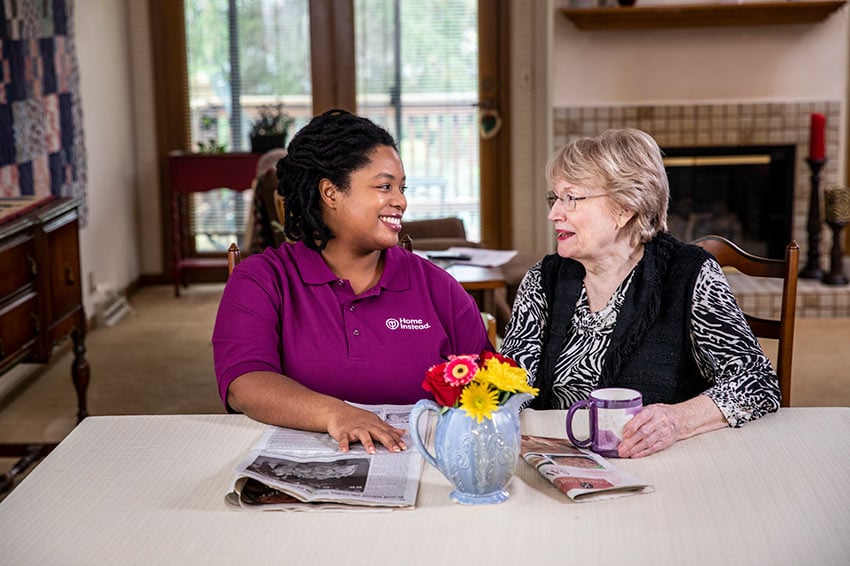Table of Content
Downs Syndrome – Many people with DS develop Early Onset signs of Dementia by the time they reach middle age. Most people develop symptoms gradually over a period of years and its progression can be different for each individual due to which parts of the brain are affected. Home Instead offers monthly email newsletters with tips and advice for caretakers of elderly loved ones. If your loved one just received the diagnosis, you’re likely anxious about the future – for your loved one and yourself. There are over 50,000 caregivers whose lives are also affected as each day they care for their loved ones who are no longer able to care for themselves. About 44,000 people in Ireland are currently living with some form of dementia - a number that is expected to reach nearly 104,000 by 2037.

All care – including any you pay for – should help you to live well with dementia. The types of care put in place will be different for everyone, because everyone’s needs are different. Advice for people affected by dementia during the cost of living crisis . If you are paying part or all of your own fees, it is important that you are claiming all the benefits you are entitled to. Your carer or a family member may be able to help you with this. This applies especially in cases where the carer has given up their own home to care for you.
Looking for caregiving advice?
Many people with dementia in fact unnecessarily end up in hospital in costly crisis driven interventions which could have been avoided if the correct supports were in place in our communities. If you need independent financial advice so that you can make informed decisions, the HSC trust should help you to access it. You can ask for information and advice about understanding care charges, and ways to pay for them.
Comfort Keepers understands the challenges that a family faces when caring for a loved one with Alzheimer’s disease or dementia, especially when enabling them to live safely at home. We have an experienced team of healthcare assistants to provide the bespoke support that you or your loved one needs. Care for Me is a great service for the following reasons; each of the carers are kind, caring, good listeners and are a credit to the company. Dementia is an umbrella term used to describe a wide range of illnesses that affect the brain causing the brain cells to die. It's a progressive disease that affects cognitive abilities.
Risk Factors
Our purposefully designed unit, was established to provide specialist long-term care to people with dementia who wish to live in a homely, personalised and safe environment. By empowering the person with dementia and their family members, appropriate home care help. The care can be less about spending quality time and enabling the person and more about carrying out specific tasks. This creates a dependency, and does little to promote independence. This can end up further increasing the challenges people face when living with the condition.
An assessment of needs will provide information about the type of care you need and what options are available. This can help you decide whether the care home you are considering is appropriate. It may help to speak to your local Citizen’s Advice or Age NI for a benefits check to find out whether financial help is available. Your carer may also find this useful – in areas such as protecting their pension rights, for example. If it is not possible to meet your needs within their price limit, they must fund your care in a more expensive care home.
Care for Me Homecare – Northside
Dementia Pathways complements which is an online resource for the general public offering information, service sign-posting, and advice on dementia. An expected 68,216 Irish people will be living with Dementia by 2021. More than 60% of people with dementia live in the community cared for by 50,000 family carers. People with dementia, carers and families can take control and make informed choices about care and support. However, paying for care can be complicated, and it’s best to speak to an adviser in your area. Where the value of your home is included in a financial assessment, it should not be taken into account for the first 12 weeks of you living in the care home.

Dementia is a general term used to describe a group of symptoms. These include deterioration in memory, and judgment, intellect, deterioration in social skills and language. Alzheimer's Disease is the most common casue of dementia and accounts for more than 50% of all cases.
DEMENTIA CARE IN IRELAND
People with dementia wishing to remain at home and within communities for as long as possible must be supported. 63 per cent of people in Ireland with dementia live in the community. Long-term and investment in care should reflect this reality.

In the first instance they have had a most professional approach to their work... Organizing very regular activities for residents to partake in and socialize with the aim of prolonging residents' cognitive and mental skills. These include; baking, playing games, visits from musicians, trips to local attractions. Socializing – Spending time with family, friends, community gatherings or religious meetings.
There are 64,142 people currently living with dementia in Ireland. With age being the main risk factor for dementia, this number is expected to rise alongside population ageing to 150,131 by 2045. People living with dementia will require care and support across different care settings.

Please note that we will not be able to contact you unless you have ticked this box. Few people have the opportunity to work with such a caring person as Carmel. Its rare to come across somebody who fully understands Dementia Care to end of life as Carmel does.
There are a number of healthcare professionals who can assist in diagnosing dementia and dementia care. Dementia is an umbrella term used to describe various conditions which damage brain cells and lead to a loss of brain function over time. It causes a progressive decline in mental functioning including a decline in memory, reasoning, communication skills and gradual loss of skills needed to carry out daily activities.
This should not be a result of inadequate community supports. If you are living in a care home, you might pay for all of your care and support costs, which means you are a ‘self-funder’. Or, you may make a contribution, with the HSC trust also contributing, or the HSC trust may pay the full cost.



